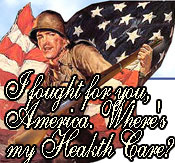 Subjecting veterans to the profit-maximizing health insurance industry leaves our moral debt unpaid.
Subjecting veterans to the profit-maximizing health insurance industry leaves our moral debt unpaid.
by Eric Haas, Rockridge Nation
Last April, President Bush told members of American Legion Post 177 that "we owe the families and the soldiers the best health care possible."
That debt is still unpaid. According to a new report by Harvard Medical School researchers, published last week in the peer-reviewed American Journal of Public Health, millions of veterans and their family members have not been getting the medical care they need.
People assume that veterans automatically get health care from Veterans Affairs (VA). They don't. Despite their military service, the Bush Administration requires most veterans to pay additional money for insurance in order to get care. But many veterans don't earn enough money to be able to buy health insurance. At the same time, they aren't poor enough under Bush Administration guidelines to get VA care or to qualify for Medicaid. Abandoned, these veterans struggle alone to find health care. In the insurance marketplace, our veterans remain in harms way — their service, and our debt, forgotten…
Why haven't we made good on our obligation? Our moral debt to our veterans, based on mutual need and shared responsibility, goes unpaid in the current health insurance system because it is based upon corporate self-interest. An insurance company's responsibility is to maximize profit, even when that means denying care to veterans. Clearly, our national moral responsibility is not the same as an insurance company's corporate fiduciary duty to maximize profits. (This concept is discussed further in our Rockridge Institute paper, The Logic of the Health Care Debate).
In fact, as the veterans' predicament demonstrates, these obligations can be quite contradictory. A vet is a national hero. Soldiers risk their lives. Many will be injured. Some will die. In return, we promise to support our troops in whatever way possible — both on the battlefield and when (or if) they return as veterans. Certainly, our support includes medical care.
There is no price that can be put on the risks a soldier takes. Nor is there a way to estimate the care a veteran will need during their lifetime. Our mutual obligations are easily understood, but impossible to quantify.
But a health insurance company's duty is to its shareholders. Its legal and contractual obligation is to maximize profits. Health insurance companies do that by quantifying likely health costs, and selling the policies for more than they will pay out in benefits. If you cannot afford their policies, then they will not sell you one. Simply put, a veteran is just another potential customer.
The national failure to meet our shared obligations to veterans — who risked life and limb on our behalf — is a disgrace. It betrays the moral vacuum at the center of our current health care system.
Let's simplify to make this ugly circumstance as clear as we can. Imagine a town. Inside the town live health insurance executives and the politicians who serve their interests. Soldiers risk life and limb to protect the town. Later, a soldier gets sick. "Sorry, you don't earn enough to afford our insurance policies. Try the next town," say the insurance executives. Except, in America, there is no "next town."
One way that we could meet our national obligation to support our troops is for the government to provide or guarantee medical care for all veterans. A version of this idea occurred through the Veterans' Health Care Eligibility Reform Act of 1996 (Public Law 104-262). The Act opened VA care to all veterans, with copays for those veterans considered to be "non-poor" (generally those making $30,000 and higher). In January 2003, however, the Bush Administration ordered a halt to the enrollment of "non-poor" veterans. The VA facilities were "full." To date, it's no better. As a result, according to the Harvard Medical School study, millions of vets and their family members cannot afford health insurance and go everyday without needed medical care. That is tragic. Something must change.
The authors elegantly summarize the central role that veterans and health care play in our national community:
The disturbing scene of returning soldiers left without care is a stark reminder that America is a nation bound by mutual obligations and shared responsibility. We owe veterans care not because they can pay for it nor because they are heroes but — as their sacrifices remind us — because members of a society are obligated to serve and protect each other.
In America, we don't have a health care system; we have an insurance marketplace. Until we understand the difference, no reform will work. To our low-income veterans, that is a daily hardship. We should make their hardship our problem too. One we solve together. Now. We owe that to our veterans.
Go to original article
"Go to Original" links are provided as a convenience to our readers and allow for verification of authenticity. However, as originating pages are often updated by their originating host sites, the versions posted on VT may not match the versions our readers view when clicking the "Go to Original" links.
(In accordance with Title 17 U.S.C. Section 107, this material is distributed without profit to those who have expressed a prior interest in receiving the included information for research and educational purposes. VT has no affiliation whatsoever with the originator of this article nor is VT endorsed or sponsored by the originator. Any opinions expressed by the author(s) are not necessarily those of VT or representative of any staff member at VT.)
ATTENTION READERS
We See The World From All Sides and Want YOU To Be Fully InformedIn fact, intentional disinformation is a disgraceful scourge in media today. So to assuage any possible errant incorrect information posted herein, we strongly encourage you to seek corroboration from other non-VT sources before forming an educated opinion.
About VT - Policies & Disclosures - Comment Policy




